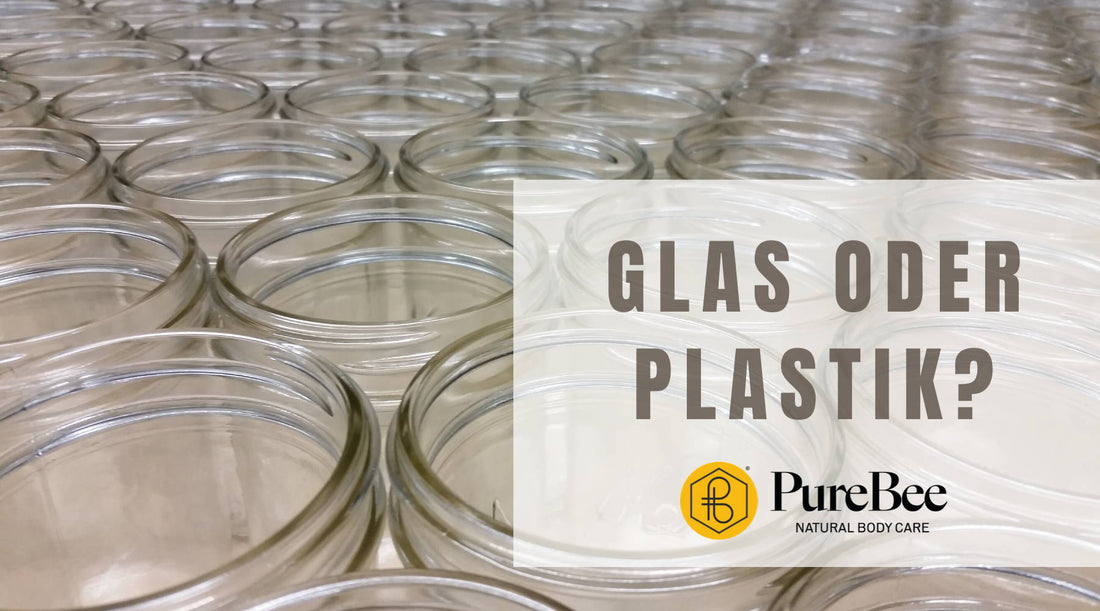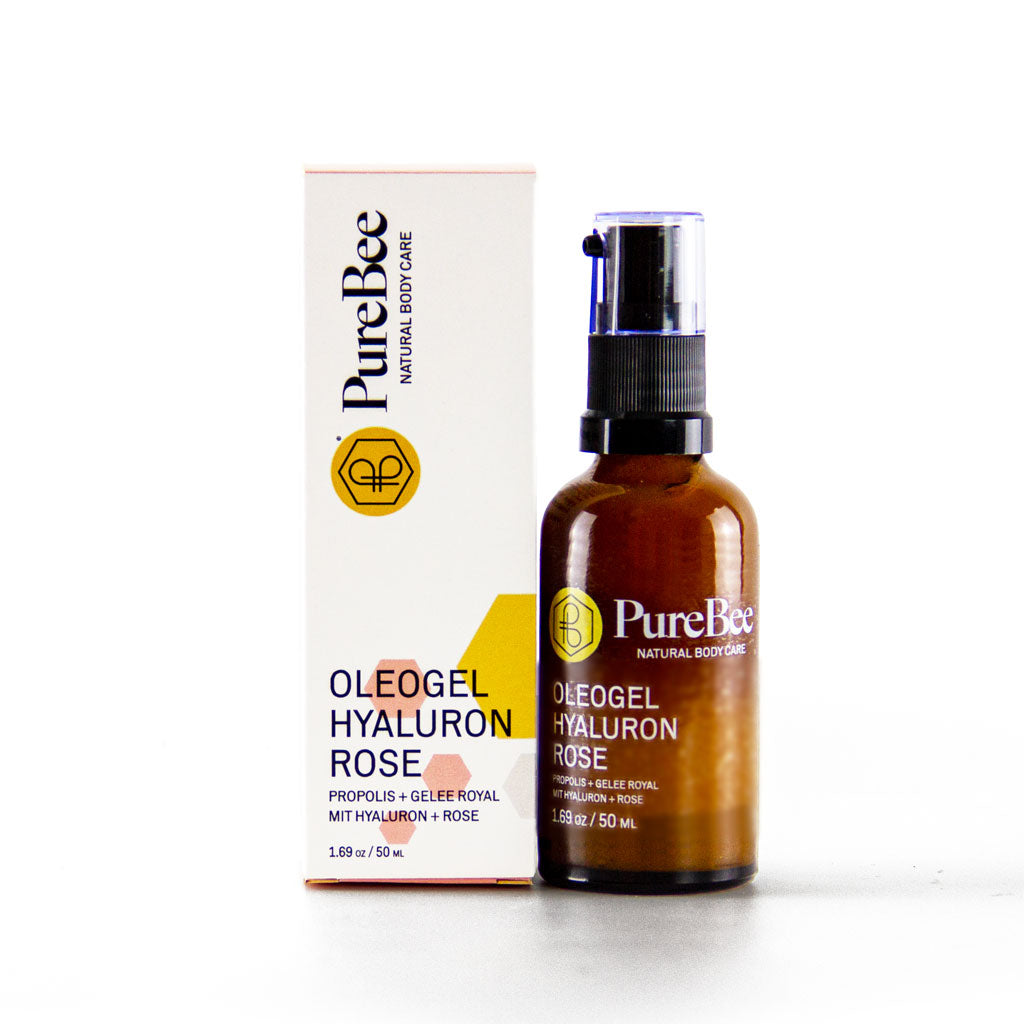An important aspect for our decision was the issue of security. Our body scrub is primarily a shower product and is also used in the shower. Especially when we are wet, a glass can easily slip out of our hands and if it breaks in the shower, this can have serious consequences. Especially in households with small children, something likes to fly down in the shower and our products should not pose a safety risk.

glass or plastic?
Share
Recently we have received many inquiries regarding our choice of packaging. Our body scrubs are packed in plastic jars. Many of you see this rather critically and we often hear: "You produce natural cosmetics, how can you then pack your body scrub in plastic?". Therefore, I would like to explain to you in this article why we use plastic here.
1. Security
Isn't glass the better solution?
Glass is impermeable to air, very easy to recycle and, as a natural material, can be disposed of without any problems. It is a suitable packaging material for some PureBee products, for example for our Oleogel, and where possible we also use glass packaging (with the Return + Recycle program ).
2. Sustainability
Many of us are now trained to avoid plastic! And I think that (on the whole) is something very positive - because saving plastic is a good idea given the mountains of garbage that we as humanity are already producing and that we are constantly allowing to grow.
However, many people do not realize that there could also be another perspective: that of the producers, especially the small ones like us. Because although it may seem at first glance that we don't seem to care at all about resource conservation, CO2 footprints and future generations with plastic packaging, this is sometimes only half the truth. Namely the ones you can see from the outside – or would like to see. But sometimes plastic is not only the more economical, but also the more ecological solution.
A few reasons for plastic and against glass
- Production : An enormous amount of energy is required to manufacture glass. This must then be recouped in consumption through long-term use. From an ecological point of view, the production of glass is always a negative business at the beginning. It should also not be forgotten that glass is also made from raw materials (sand) and this is not infinitely available.
- The cleaning : "But you have a deposit system?" we are sometimes asked. However, it is not that simple. The cleaning effort to make used glass containers fit for new cosmetics is very high and would have to be included in the environmental balance. It consumes a lot of energy and especially water.
- Acceptance: We offer our customers a deposit system . However, this requires the cooperation of the customer. Our main sales channel is online and at least customers are unfortunately willing to send back used glasses and jars so that they can be refilled, even if this is free of charge (from 10 jars). We have found that even with the honey jars, for which we have a deposit system at markets, very few find their way back to us, even though we have regular customers who keep buying from us. We therefore offer our blossom honey in a refill bag , but the environment in the shower is too humid and the bag is not suitable for this.
- Transport : Glass is much heavier than plastic. Transport therefore requires more energy and the carbon footprint of glass per gram is lower than that of plastic. In concrete terms, this means that we could fill our Body Scrub product, for example, in glass packaging weighing 300 grams – or in plastic packaging weighing 20 grams.
- Recycling : Since the body scrubs sold online would probably be disposable glass due to the lack of customer acceptance of return, the glass would have to be melted down again after use - and that usually works at temperatures of around 1000ºC, which also doesn't work is particularly environmentally friendly and causes a lot of CO2. Of course, we hope that more and more customers will take part in our Return + Recycle program and that we can use reusable glass packaging for new products.
3. And what about bioplastics?
The miracle weapon against the pollution of the oceans! Or not? Bioplastics also provide the green image, because the customer's desire for eco-plastic is very high. However, these plastics are not yet fully developed and certainly not the best thing. Bioplastics are a new development that we are really excited about. However, we also have high requirements for bioplastics: they must not have any demonstrable negative effects on food production and must not contain any genetically modified organisms (GMO). In addition, they must be easy to recycle and no deforestation may take place for their production. Good solutions that meet all of these criteria are not yet available on the market.
Three major disadvantages of bioplastics:
- It is usually obtained from corn or corn starch. And here's a big problem: In order to ease our conscience, we use staple foods to make plastic. The area used to cultivate corn plants for bioplastic production could feed many people. It also encourages food speculation and monoculture cultivation.
- Bioplastics don't decompose fast enough. A bioplastic film takes up to 12 weeks to completely decompose. A jar or a bottle would accordingly take longer. If you are not blessed with a garden with a composter and a lot of time, you will also dispose of the organic waste in the household waste. In the waste sorting plants, however, a maximum period of 10 weeks is estimated for the decomposition of biological waste. Therefore, the bioplastic is sorted out and sent for "energetic recycling". In plain language, this means that the bioplastic is ultimately burned.
- Bioplastics are not yet economical for small companies. I would also like to address the economics of bioplastics on this point. Not only is the material more expensive than conventional plastic, with minimum purchases of sometimes 50,000 containers and more, it is virtually unaffordable for small companies like ours.
Now what is the solution?
Unfortunately, there is no really satisfactory solution to this issue. The jack-of-all-trades of packaging has not yet been invented and will probably not exist anytime soon. We always encourage our customers to "recycle" our jars and bottles. They are easy to clean and the jars in particular are ideal for storing small items or refilling them with other things. Or take part in our RETURN+RECYLE program and send us your used containers back to us free of charge and receive a voucher for your next purchase as a thank you.

